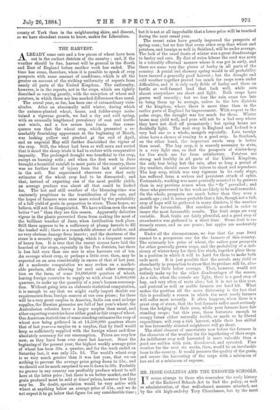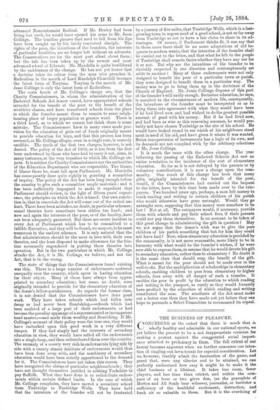MR. JESSE COLLINGS AND THE ENDOWED SCHOOLS.
IT seems strange to those who remember the early history of the Endowed Schools Act to find the policy, as well as administration, of that well-abused measure attacked, not by the old high-and-dry Tory Churchman, but by the most
advanced Nonconformist Radical. If Mr. Henley had been living last week, he would have opened his arms to Mr. Jesse Collings. The familiar phrases that used to fall from his lips have been caught up by his lately converted disciple. The rights of the poor, the intentions of the founders, the interests of particular localities, are no longer left without an advocate. The Conservatives are for the most part silent about them ; but the tale has been taken up by the newest and most advanced school of Liberals. Mr. Mundella is quite bewildered by the suddenness of the change. He has not yet learnt that a doctrine takes its colour from the man who preaches it. Radicalism in the mouth of Lord Randolph Churchill becomes the latest form of Toryism. Toryism in the mouth of Mr. Jesse Collings is only the latest form of Radicalism.
The main heads of Mr. Collings's charge are, that the Charity Commissioners, in whom the administration of the Endowed Schools Act is now vested, have appropriated schools intended for the benefit of the poor to the benefit of the wealthier classes, and have transferred schools from the place in which the founder meant them to remain to some neigh- bouring place of larger population or greater want. There is a third head, as to which we cannot but think there is some mistake. The Commissioners have in many cases made pro- vision for the education of girls out of funds originally meant to provide education for boys, and that this process has been reversed, as Mr. Collings alleges, even in a single case, is scarcely credible. The truth of the first two charges, however, is not denied. The policy of the Act of 1869, as it has from the first been understood by those who have had to carry it out, aims, in many instances, at the very transfers to which Mr. Collings ob- jects. It is neither the Charity Commissioners nor the authorities of the Education Department who are responsible. The blame, if blame there be, must fall upon Parliament. Mr. Mundella has consequently done quite rightly in granting a committee of inquiry. The policy of the Act has been long enough before the country to give such a committee ample materials ; and it has been sufficiently impugned to make it expedient that Parliament should review, in the light of fifteen years' experi- ence, the principles on which the Act is based. Our own convic- tion is, that in essentials the Act will come out of the ordeal un- hurt. There have been mistakes, no doubt, in particular schemes; sound theories have sometimes been ridden too hard ; and now and again the interests of the poor, or of the locality, have not been adequately protected. But these are errors incident to every Act of Parliament which has to be committed to a fallible Executive, and they will be found, we suspect, to be most numerous in the earliest schemes. It is only natural that the first administrators should be the most in love with their own theories, and the least disposed to make allowance for the fric- tion necessarily engendered in putting these theories into operation. But in the two particulars in which Mr. Collings attacks the Act, it is Mr. Collings, we believe, and not the Act, that is in the wrong.
The state of things that the Commissioners found existing was this. There is a large number of endowments scattered unequally over the country, which agree in having education for their object. Many of these have always been appro- priated to secondary education ; but some, no doubt, were originally intended to provide for the elementary education of the donor's fellow-parishioners. As regards the former class, it is not denied that the Commissioners have done good work. They have taken schools which had fallen into decay or had never been flourishing,—schools which had been mulcted of a large part of their endowments, or had become the peculiar appanage of a superannuated or incompetent head master,—and made them wealthy and flourishing. If Mr. Collings's account of their policy were the true one, they would have embarked upon this good work in a very different temper. If they had simply had the interests of secondary education in view, they would have rolled all the endowments into a single heap, and then redistributed them over the country. The anomaly of a county very rich in endowments lying aide by side with a county almost destitute of endowments would thus have been done away with, and the machinery of secondary education would have been strictly apportioned to the demand for it. The Commissioners have not taken this course. They have recognised the claims of particular neighbourhoods ; they have not thought themselves justified in robbing Yorkshire to pay Suffolk. What they have done is to redistribute endow- ments within certain defined limits. In the ease of which Mr. Collings complains, they have moved a secondary school from Tunbridge to Tunbridge Wells. They have held that the intention of the founder will not be frustrated
by a journey of five miles, that Tunbridge Wells, which is a fast- growing town in urgent need of a good school, is not so far away from Tunbridge as not to have a fair claim to share in its ad- vantages. Of course, if Parliament thinks fit, it can say that in these cases there shall be no more adaptations of old be- quests to modern wants, that the intention of the founder shall be carried out to the letter, and that what he left to the people of Tunbridge shall remain theirs whether they have any use for it or not. But why are the intentions of the founder to be slavishly respected in one direction and contemptuously set aside in another ? Many of these endowments were not only designed to benefit the poor of a particular town or parish, they were designed to benefit them in a particular way. The money was to go to bring them up in the doctrines of the Church of England. Mr. Jessie Collings disposes of this part of the founder's will easily enough. Sectarian education, he says, is unsuited to the circumstances of modern life, consequently, the intentions of the founder must be interpreted so as to bring them into agreement with what they would have been if he had lived now, and had wished to do the greatest possible amount of good with his money. But if he had lived now, and had been as wise as this reasoning assumes, he would pro- bably not have chosen Tunbridge as the site of his school. He would have looked round to see which of his neighbours stood most in need of his aid, and have given it where it was wanted. Strict interpretation of instruments has a logic of its own, and its demands are not complied with by the arbitrary selections of Mr. Jesse Collings.
It is much the same with the other charge. The year following the passing of the Endowed Schools Act saw an entire revolution in the incidence of the cost of elementary education. So far as it is not defrayed by the parents or by voluntary contributions, it is now a charge upon the com- munity. One result of this change has been that many gifts, originally intended for the benefit of the poor, would, if the Commissioners had carried out the bequest to the letter, have by this time been made over to the rate- payers. Two hundred years ago, perhaps, a man left money to teach reading and writing to certain children of his parish who would otherwise have gone untaught. Would they go untaught now, supposing that this money were somehow to be lost ? Not at all. The ratepayers would, if necessary, provide them with schools and pay their school fees, if their parents could not pay them themselves. Is no account to be taken of this great change in administering the gift in question? May we not argue that the donor's wish was to give the poor children of his parish something that but for him they could not have had ? Now, when elementary education is provided by the community, is it not more reasonable, more likely to be in harmony with what would be the founder's wishes, if he were now able to express them, to assume that he would devote his gift to secondary education, rather than to elementary ? No doubt it is the same class that should reap the benefit of the gift. What is meant for the poor should not be made over to the well-to-do. But the multiplication of scholarships in elementary schools, enabling children to pass from elementary to higher schools, does away with all danger of such a transfer. It enables the poor to profit by the education to which reading and writing is the passport, as surely as they would formerly have profited by the education of which reading and writing constituted the sum. The assailants of the Act must make out a better case than they have made out yet before they can hope to persuade a Select Committee to recommend its repeal.



































 Previous page
Previous page